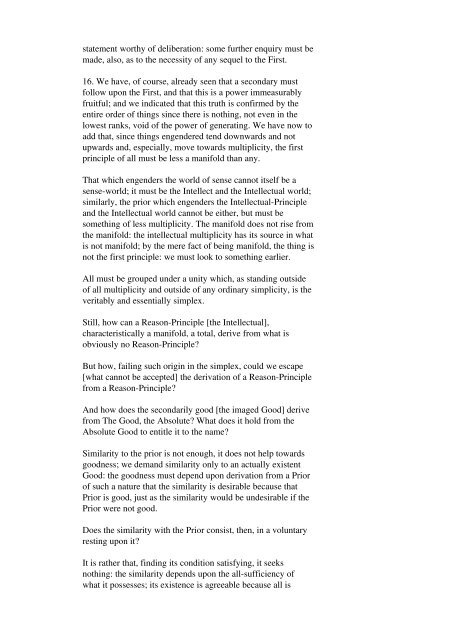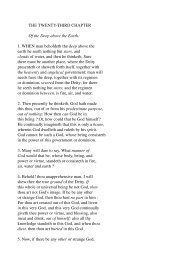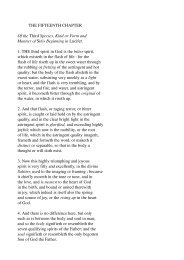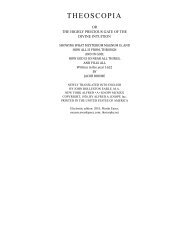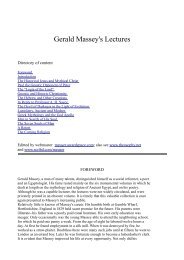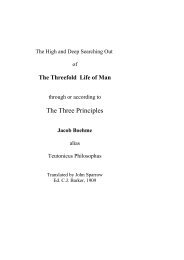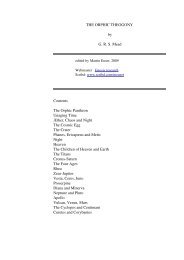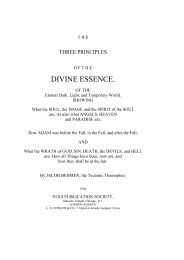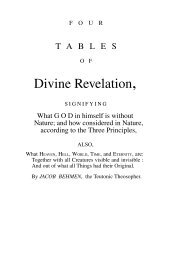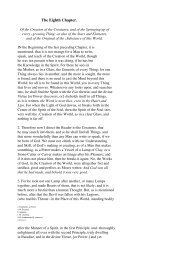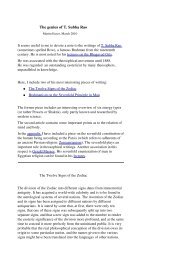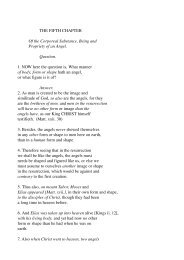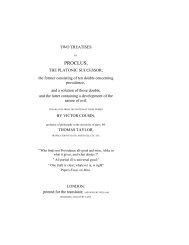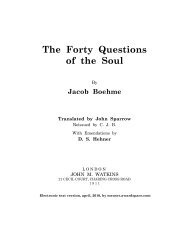- Page 1 and 2:
Plotinus: Enneads notes written in
- Page 3 and 4:
Directory of contents THE FIRST ENN
- Page 5 and 6:
THE SIXTH ENNEAD. I: On the kinds o
- Page 7 and 8:
then the Soul will be an IdealFor
- Page 9 and 10:
incongruous in kind, let us say of
- Page 11 and 12:
they themselves remaining unaffecte
- Page 13 and 14:
mirrors. The first of these images
- Page 15 and 16:
sinned, then the AnimatingPrincip
- Page 17 and 18:
Ennead I Second tractate: On virtue
- Page 19 and 20:
2. First, then, let us examine thos
- Page 21 and 22:
whole of this human quality, virtue
- Page 23 and 24:
6. In all this there is no sin th
- Page 25 and 26:
conduct: for example, Restraint in
- Page 27 and 28:
stirring of himself towards the sup
- Page 29 and 30:
state or rather the discipline from
- Page 31 and 32:
things. By sensation can be meant o
- Page 33 and 34:
Those, then, that set happiness not
- Page 35 and 36:
knows himself to stand above all su
- Page 37 and 38:
slightest lessening of his happines
- Page 39 and 40:
common mind. We cannot be indolent:
- Page 41 and 42:
eyond number. So that it would even
- Page 43 and 44:
lessen it. When in the one subject,
- Page 45 and 46:
wellbeing will be greater than to
- Page 47 and 48:
to break up in its fragmentary flig
- Page 49 and 50:
Is there some One Principle from wh
- Page 51 and 52:
We hold that all the loveliness of
- Page 53 and 54:
Such vision is for those only who s
- Page 55 and 56:
Hence the Mysteries with good reaso
- Page 57 and 58:
vision of the inaccessible Beauty,
- Page 59 and 60:
Ennead I Seventh tractate: On the p
- Page 61 and 62:
life and not its death; the misfort
- Page 63 and 64:
upon the Third. 3. If such be the N
- Page 65 and 66:
out from the FormingIdea that ord
- Page 67 and 68:
vice. And when the disputant in tha
- Page 69 and 70:
existence of Evil. Given that The G
- Page 71 and 72:
which is lacking to the entire form
- Page 73 and 74:
We teach that Virtue is not the Abs
- Page 75 and 76:
intellectual act; for desire has Go
- Page 77 and 78:
Ennead II First tractate: On the ko
- Page 79 and 80:
2. Supposing we accept this view an
- Page 81 and 82:
Our doctrine of the immortality of
- Page 83 and 84:
But what place could there be for t
- Page 85 and 86:
ordered universe so that something
- Page 87 and 88:
Ennead II Second tractate: The heav
- Page 89 and 90:
presence to the heavens, too, in th
- Page 91 and 92:
then, ringed round by the higher an
- Page 93 and 94:
In that case, what have they suffer
- Page 95 and 96:
order could be admitted, the very o
- Page 97 and 98:
a few examples of everyday experien
- Page 99 and 100:
For every human Being is of twofold
- Page 101 and 102:
ut before their driver sets the cou
- Page 103 and 104:
elected guardianspirit becomes ac
- Page 105 and 106:
If such a conception of Soul be rej
- Page 107 and 108:
This ultimate phase, then, is the M
- Page 109 and 110:
e clear when we are sure of its pre
- Page 111 and 112:
ody. An additional proof that bodie
- Page 113 and 114:
If, for example, it possessed a mag
- Page 115 and 116:
described as the impact of the shap
- Page 117 and 118:
them entering into Magnitude and no
- Page 119 and 120:
is differentiated, then it is diffe
- Page 121 and 122:
Indefiniteness entering as an attri
- Page 123 and 124:
For in Matter we have no mere absen
- Page 125 and 126:
But is an ignorant man a being of k
- Page 127 and 128:
Why not? If that Nature is rightly
- Page 129 and 130:
Potentiality, we destroy the founda
- Page 131 and 132:
And this is the startingpoint of
- Page 133 and 134:
appearance of quality from the fact
- Page 135 and 136:
decree of Nature to allow of the sw
- Page 137 and 138:
This would mean that the qualities
- Page 139 and 140:
any one clearly discerned magnitude
- Page 141 and 142:
transcendent than this whose existe
- Page 143 and 144:
3. Ever illuminated, receiving ligh
- Page 145 and 146:
the heavens have had no communion w
- Page 147 and 148:
Principle, accounting for the diffe
- Page 149 and 150:
This All that has emerged into life
- Page 151 and 152:
It is not by crushing the divine un
- Page 153 and 154:
them then they tell us that the o
- Page 155 and 156:
later origin than Nature and the Un
- Page 157 and 158:
Transcendents they are simply utt
- Page 159 and 160:
can "look" and still sacrifice no p
- Page 161 and 162:
They will think of the Intellectual
- Page 163 and 164:
to address the lowest of men as bro
- Page 165 and 166:
movements apart from will and cause
- Page 167 and 168:
science can operate where there is
- Page 169 and 170:
Place and climate, no doubt, produc
- Page 171 and 172:
all the causative forces enter into
- Page 173 and 174:
against all good sense. Such a noti
- Page 175 and 176:
jarring, no internal hindering; the
- Page 177 and 178:
the Souls pass from body to body en
- Page 179 and 180:
the good nothing is evil and to the
- Page 181 and 182:
ordered system or in what degree th
- Page 183 and 184:
Providence does not allow him to be
- Page 185 and 186:
to which their quality entitles the
- Page 187 and 188:
e declared well done. This new diff
- Page 189 and 190:
divine Hypostases; the Intellectual
- Page 191 and 192:
Thus, every man has his place, a pl
- Page 193 and 194:
For, in the All, the sequences, inc
- Page 195 and 196:
operations, and there is no power o
- Page 197 and 198:
necessarily reside in all men, sure
- Page 199 and 200:
All such rightdoing, then, is lin
- Page 201 and 202:
7. And since the higher exists, the
- Page 203 and 204:
dominant, and when the lifeprinci
- Page 205 and 206:
No: where all is the working out of
- Page 207 and 208:
above it: and those in the world of
- Page 209 and 210:
God: Nature produces by looking to
- Page 211 and 212:
Any Nature springing directly from
- Page 213 and 214:
of life, so the single separate Lov
- Page 215 and 216:
Because Soul pure of the Kosmos gen
- Page 217 and 218:
greater Soul, superior; but all bel
- Page 219 and 220:
10. "Our way of speaking" for myt
- Page 221 and 222:
find ourselves unconsciously making
- Page 223 and 224:
So with the faculty of desire: what
- Page 225 and 226:
oppressed by sensation, jarred out
- Page 227 and 228:
would be more nearly the nonexisten
- Page 229 and 230:
Principle, no ReasonPrinciple; it
- Page 231 and 232:
modification when there is no more
- Page 233 and 234:
seeing that these are affected by e
- Page 235 and 236:
ecoming inflamed"; once we have Mat
- Page 237 and 238:
No: How could there be a true entry
- Page 239 and 240:
15. Now the objects attracting the
- Page 241 and 242:
thereby engenders secondaries]: in
- Page 243 and 244:
The [Universal] Soul containing t
- Page 245 and 246:
the realm of Process, in our own Un
- Page 247 and 248:
essence. Considering this multifari
- Page 249 and 250:
action and by its circling in a sor
- Page 251 and 252:
If, then, there is no first or last
- Page 253 and 254:
concerned with change. Of those tha
- Page 255 and 256:
discussion has aimed at from the fi
- Page 257 and 258:
the question as to the thing of whi
- Page 259 and 260:
present: it stirred from its rest,
- Page 261 and 262:
If, then, the Soul withdrew, sinkin
- Page 263 and 264:
Suppose that Life, then, to revert
- Page 265 and 266:
compulsory act, which tends rather
- Page 267 and 268:
possession of it own characteristic
- Page 269 and 270:
it did, it would no longer be every
- Page 271 and 272:
knowing all its content: when there
- Page 273 and 274:
anything else is no thought. This i
- Page 275 and 276:
To this question the answer is that
- Page 277 and 278:
Every particular thing has a One of
- Page 279 and 280:
Ennead III Ninth tractate: Detached
- Page 281 and 282:
At no point did the AllSoul come
- Page 283 and 284:
It possesses Itself and therefore i
- Page 285 and 286:
Ennead IV Second tractate: On the e
- Page 287 and 288:
consist of separate sections; its d
- Page 289 and 290:
qualities." Soul, therefore, is, in
- Page 291 and 292:
the standard "ten" in abstract nu
- Page 293 and 294:
A further proof [of the unity of So
- Page 295 and 296:
to its own Intellectual original: t
- Page 297 and 298:
As for our souls being entrained in
- Page 299 and 300:
was in the larger body; that body h
- Page 301 and 302:
Our knowledge of the first is gaine
- Page 303 and 304:
their being. 12. The souls of men,
- Page 305 and 306:
without that the law derives the po
- Page 307 and 308:
in the distribution of due, while,
- Page 309 and 310:
must be of soul present throughout
- Page 311 and 312:
already existent thing; soul, on th
- Page 313 and 314:
concerned makes itself present; the
- Page 315 and 316:
are present where memory exists. No
- Page 317 and 318:
It may be suggested the while the s
- Page 319 and 320:
desiring faculty is apt to be stirr
- Page 321 and 322:
solution must be sought. Perhaps me
- Page 323 and 324:
Ennead IV Fourth tractate: Problems
- Page 325 and 326:
total of things brings that of the
- Page 327 and 328:
awaken, so to speak, and thus attai
- Page 329 and 330:
First: it is not essential that eve
- Page 331 and 332:
him and is seen by an indwelling
- Page 333 and 334:
operation, acts of reasoning and of
- Page 335 and 336:
turn; and there is the still higher
- Page 337 and 338:
own nature; this is no more than su
- Page 339 and 340:
speaking of two natures. When one d
- Page 341 and 342:
withholding belongs to another agai
- Page 343 and 344:
decide whether earth could have sen
- Page 345 and 346:
injure us or even before it has beg
- Page 347 and 348:
And there is nothing against the id
- Page 349 and 350:
some of our associates act against
- Page 351 and 352:
it, attached to it, but also at onc
- Page 353 and 354:
We have, then, to attempt to show:
- Page 355 and 356:
the terrestrial in general, what ca
- Page 357 and 358:
Or, a better statement: the entire
- Page 359 and 360:
ReasonPrinciples has brought them
- Page 361 and 362:
similarly the All could not have it
- Page 363 and 364:
No: the ReasonPrinciple of the un
- Page 365 and 366:
attention to prayers as some have t
- Page 367 and 368:
implies a magic attraction. The ans
- Page 369 and 370:
the All by settling every member in
- Page 371 and 372:
of intervenient gives a still easie
- Page 373 and 374:
and relating the parts to each othe
- Page 375 and 376:
need a stick in the hand to touch s
- Page 377 and 378:
no reason why they should draw the
- Page 379 and 380:
association with Matter, its activi
- Page 381 and 382:
as related to its content. And the
- Page 383 and 384:
objects become known. Our tendency
- Page 385 and 386:
the point of being easily able to r
- Page 387 and 388:
2. But of what nature is this sover
- Page 389 and 390:
things of the universe, they could
- Page 391 and 392:
if soul [as corporeal] were a defin
- Page 393 and 394:
7. We come to the same result by ex
- Page 395 and 396:
the activities observed in bodies
- Page 397 and 398:
considered as actualized is of high
- Page 399 and 400: An identical soul is now the soul o
- Page 401 and 402: sees is an IntellectualPrinciple
- Page 403 and 404: knowing no impulse or appetite, is
- Page 405 and 406: sense, blames the commerce of the s
- Page 407 and 408: 3. The Human Soul, next; Everywhere
- Page 409 and 410: as "parts," and goes on to say that
- Page 411 and 412: Intellectual nature. 7. The Kind, t
- Page 413 and 414: If the soul in me is a unity, why n
- Page 415 and 416: everywhere? The answer is that even
- Page 417 and 418: the items that go to constitute it
- Page 419 and 420: e at peace, body's turmoil stilled,
- Page 421 and 422: ight, vested with a selfspringing
- Page 423 and 424: 6. But how and what does the Intell
- Page 425 and 426: The items of this potentiality the
- Page 427 and 428: 9. Anaxagoras, again, in his assert
- Page 429 and 430: permanent Right, the source and fou
- Page 431 and 432: from the IntellectualPrinciple wh
- Page 433 and 434: the knowledge of these things is a
- Page 435 and 436: We cannot describe it as belonging
- Page 437 and 438: strange phenomenon. How is the self
- Page 439 and 440: that it is already of itself in som
- Page 441 and 442: light, and, if it should see, then,
- Page 443 and 444: towards it; our life is broken and
- Page 445 and 446: essence but, with all its effort to
- Page 447 and 448: Principle: the One does not provide
- Page 449: We do not, it is true, grasp it by
- Page 453 and 454: May we stop, content, with that? No
- Page 455 and 456: the best of all that follows. 2. If
- Page 457 and 458: intellective, can this be conceived
- Page 459 and 460: instead of truth; belief is our lie
- Page 461 and 462: measure and not the measured; it is
- Page 463 and 464: it: to seek to throw a line about t
- Page 465 and 466: contained. And if the Intellect, to
- Page 467 and 468: for neither rest nor movement can b
- Page 469 and 470: unconcerned, exactly as He would no
- Page 471 and 472: primally intellective must be at on
- Page 473 and 474: Principle must be characteristic of
- Page 475 and 476: aggregate. When a thing is a Being,
- Page 477 and 478: Is the differentiating element to b
- Page 479 and 480: exists in a far higher state in the
- Page 481 and 482: of the beauty that is found in mate
- Page 483 and 484: to the Being, but its very essence.
- Page 485 and 486: and their outer limbs and that ha
- Page 487 and 488: plane, of the sun and of all the st
- Page 489 and 490: direction of the will. All that one
- Page 491 and 492: involved: it fails to see that as l
- Page 493 and 494: The guiding thought is this: that t
- Page 495 and 496: And if, further, soul is passible w
- Page 497 and 498: All are one there and yet are disti
- Page 499 and 500: of life; but its Being and its mode
- Page 501 and 502:
13. It remains to decide whether on
- Page 503 and 504:
categories. That the term Being has
- Page 505 and 506:
These considerations are sufficient
- Page 507 and 508:
To be more precise, we may define s
- Page 509 and 510:
objective truth behind the relation
- Page 511 and 512:
when greatness and smallness are ac
- Page 513 and 514:
analogy. Thus, Quality is a power w
- Page 515 and 516:
classed as qualities in virtue of b
- Page 517 and 518:
nonliving powers which we have cl
- Page 519 and 520:
elative whatever may be produced fr
- Page 521 and 522:
to the potentially active, Motion t
- Page 523 and 524:
Again, in the case of walking there
- Page 525 and 526:
What then is the real distinction b
- Page 527 and 528:
Possession, thus, would include the
- Page 529 and 530:
of the actual Existents and of thei
- Page 531 and 532:
called substrate turns out to have
- Page 533 and 534:
they are bodiless and active, since
- Page 535 and 536:
Ennead VI Second tractate: On the k
- Page 537 and 538:
the particulars: what then becomes
- Page 539 and 540:
quantity, the quality though they
- Page 541 and 542:
One, in the sense of being one Reas
- Page 543 and 544:
itself, and how it puts apart thing
- Page 545 and 546:
things are not beings in the sense
- Page 547 and 548:
genus. The point inherent in a line
- Page 549 and 550:
We may again be asked how the point
- Page 551 and 552:
15. How then do the four genera com
- Page 553 and 554:
likeness of The Good. But if this "
- Page 555 and 556:
intellects, is the potentiality of
- Page 557 and 558:
Everything exists forever, unfailin
- Page 559 and 560:
and in possession of a common name,
- Page 561 and 562:
Let us begin by distinguishing Matt
- Page 563 and 564:
external. It may be claimed as a co
- Page 565 and 566:
What, then, is the meaning of "exis
- Page 567 and 568:
especially in regard to Sensible Su
- Page 569 and 570:
whole in comparison with a science?
- Page 571 and 572:
millet large? Surely, in the first
- Page 573 and 574:
two, and two creates three, but tha
- Page 575 and 576:
held in common. May the truth be th
- Page 577 and 578:
Are we, then, to rank the individua
- Page 579 and 580:
Do all qualities constitute differe
- Page 581 and 582:
We shall accordingly maintain that
- Page 583 and 584:
If we are agreed that Quality and Q
- Page 585 and 586:
establish the claim of Motion to be
- Page 587 and 588:
the differentia which separates loc
- Page 589 and 590:
27. What view are we to take of tha
- Page 591 and 592:
Ennead VI Fourth tractate: On the i
- Page 593 and 594:
it preserves itself in neighbouring
- Page 595 and 596:
A further objection is that some on
- Page 597 and 598:
above both that reports, and this i
- Page 599 and 600:
selfconcentrated, immune from par
- Page 601 and 602:
places; to think its light may be l
- Page 603 and 604:
There is no such extension. Sense
- Page 605 and 606:
the body of the living form that ha
- Page 607 and 608:
Ennead VI Fifth tractat: On the int
- Page 609 and 610:
and projected from it enter at vari
- Page 611 and 612:
ourselves, for we are There among t
- Page 613 and 614:
participation. The essential unity
- Page 615 and 616:
extension of the corporeal? How can
- Page 617 and 618:
all the earth and heaven, everywher
- Page 619 and 620:
principle of limitation. The unlimi
- Page 621 and 622:
number, making it no more than an a
- Page 623 and 624:
Against doubters we cite the fact o
- Page 625 and 626:
For the Unity is source to Being; B
- Page 627 and 628:
completest Being, then the other he
- Page 629 and 630:
separate many into one, either supp
- Page 631 and 632:
thing possesses also size, form, an
- Page 633 and 634:
Be it so; we begin by pointing out
- Page 635 and 636:
manner of being, for all configurat
- Page 637 and 638:
every soul and every intellect seek
- Page 639 and 640:
Principle is at once Man and the re
- Page 641 and 642:
to recognise this perfection in its
- Page 643 and 644:
The Man of the realm of birth has s
- Page 645 and 646:
prototype There of the living form,
- Page 647 and 648:
man: take it where you will, every
- Page 649 and 650:
ings out a fire already existent in
- Page 651 and 652:
so moved. A simplex moving retains
- Page 653 and 654:
there is nothing that does not live
- Page 655 and 656:
this form is in the shaped, the sha
- Page 657 and 658:
have a measure of identity, the mat
- Page 659 and 660:
21. Now what in all these objects o
- Page 661 and 662:
But what does it effect now? Even n
- Page 663 and 664:
26. Any conscious being, if the goo
- Page 665 and 666:
But if Matter by very essence is ev
- Page 667 and 668:
pleasure." But this is no more than
- Page 669 and 670:
33. When therefore we name beauty,
- Page 671 and 672:
nothing to say of this very Intelle
- Page 673 and 674:
nobler; we are to suppose that so h
- Page 675 and 676:
see the self as external is the neg
- Page 677 and 678:
41. Intellection seems to have been
- Page 679 and 680:
not yet achieved. But for the momen
- Page 681 and 682:
Taking it that the presentment of f
- Page 683 and 684:
that virtue has a freedom and self
- Page 685 and 686:
allegiance, lord of its own act. Th
- Page 687 and 688:
authentically king, authentically P
- Page 689 and 690:
a principle beyond, but the princip
- Page 691 and 692:
Consider also that every being in i
- Page 693 and 694:
itself, then, as author of reason,
- Page 695 and 696:
more perfect form; these beings of
- Page 697 and 698:
19. Stirred to the Supreme by what
- Page 699 and 700:
the first. As for his "selfcontai
- Page 701 and 702:
moving out to reckon, then the unit
- Page 703 and 704:
The Unity, then, is not Intellectua
- Page 705 and 706:
surely as that of soul yet, thoug
- Page 707 and 708:
were better left out, the more sure
- Page 709 and 710:
efore the Supreme cut off is utte
- Page 711 and 712:
centre, for on this higher plane th


